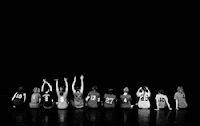So Andrea Selch and I went to watch the dancers rehearse, just to get a feel for what they were interested in and to make a plan of action. For me, I talked about my idea for the poem and afterwards they did some spontaneous movement in response. I took notes during the whole process and then went home to write.
I was interested in writing about Charles Jenkins. http://en.wikipedia.org/wiki/Charles_Robert_Jenkins
He's a North Carolina soldier who defected to North Korea in 1965, was long believed dead, and was "discovered" in 2002 when North Korea admitted to Japan that they had kidnapped Japanese citizens to train North Korean spies. (Jenkins is married to Hitomi Soga, a kidnapped Japanese woman.) Soga returned to Japan, but Jenkins and their two daughters stayed in North Korea, partially because (he later revealed) he was afraid he and his daughters would be killed if they said they too wanted to leave and partially because the US Army refused not to prosecute him for desertion, which has a 40 year statute of limitations. Eventually, he, his daughters, and Soga were reunited in Indonesia and he served 30 days for desertion and received a dishonorable discharge in September of 2004. He later returned briefly to North Carolina to visit his then 91 year old mother and currently lives in Japan with his wife and daughters.
I was fascinated with this story for several reasons- (1) My interest in North Korea (2) Jenkins's story- 15 when he joined the National Guard, 8th grade education (3) the connection to the war now- most immediately, the Army was afraid to pardon Jenkins because they were afraid it would encourage soldiers in Afghanistan and Iraq to defect, an amazing admission I think.
The dancers had several movements which I found shaped my thinking. They gathered in 2 groups at the end of the space, crossing over back and forth between groups, often pointing across to each other while huddled in a tight group. At one point, they were grouped together on the floor in a way that reminded me of puppies or kittens sleeping in a heap. It encouraged me to think about the loneliness and separation aspect of this story, when Jenkins was both in North Korea and in the Army, how the Army is a place of instant fictive kinship, as is North Korea- they are all brothers and sisters because of the group they belong to and how attractive that has to be. (It's one thing that fascinated about North Korea, the strengths and limitations of being a member of a community.)
So these are the things I'm exploring in the poem in different areas of Jenkins's life- when he was 15 in NC, when he was on the border afraid of getting the men under his command killed, when he was in North Korea living with 4 other GI's who defected, when he was married with a family, when he saw his mother again. I'm working on a draft this weekend- I'll try to post it next week.
Friday, March 30, 2007
Tuesday, March 20, 2007
Dances With Poets


The Carolina Wren Press http://carolinawrenpress.org/index.html is working in conjunction with a Durham dance group, Choreo Collective http://choreo.devel.rainsdance.org/ to produce a collaborative work between dancers and poets. There are 4 poets working with the dance group. Jaki Shelton Greene is working one on one with a dancer to produce a piece (it's very hush-hush. They are meeting in secret and no one knows what they are up to.), Andrea Selch is reading a previously written poem and 4 different groups of dancers are choreographing a piece to the poem. One poem, 4 dance results. Shirlette Ammons http://www.stumphole.com/index.html is getting ready to meet with dancers and may work as the choreographer to her piece, and I am working in conjunction with a group of dancers.
This blog is a place to track the process I am going through in the production of this piece. I went to AWP a few weeks back and heard a group of poets talk about using appropriated texts and the in the presentation I liked best, Mairead Byrne http://maireadbyrne.blogspot.com/ talked about the process she went through when writing a particular piece. It helped me a great deal appreciate both the poem and understand my own process as a writer. (If you haven't read Mairead Byrne do so quickly- she's my new favorite poet, but really, why wasn't I paying attention earlier? Let's hope my intervention here will help you avoid the same mistake.)
This blog is a place to track the process I am going through in the production of this piece. I went to AWP a few weeks back and heard a group of poets talk about using appropriated texts and the in the presentation I liked best, Mairead Byrne http://maireadbyrne.blogspot.com/ talked about the process she went through when writing a particular piece. It helped me a great deal appreciate both the poem and understand my own process as a writer. (If you haven't read Mairead Byrne do so quickly- she's my new favorite poet, but really, why wasn't I paying attention earlier? Let's hope my intervention here will help you avoid the same mistake.)
I do this all the time when teaching composition- talk the students through what I do when approaching a similar kind of assignment. I often show them my notebooks that I keep for different projects and I often describe both my thinking and the steps I take and the order I take them in. No reason poets shouldn't do this for each other as well. I hope this blog will work in a kind of similar way. I'll be posting drafts of work, descriptions of the process, and any useful visuals along the way, as well as a recap after the performance. Questions or comments? Let me know.
Tanya
Tanya
Subscribe to:
Posts (Atom)